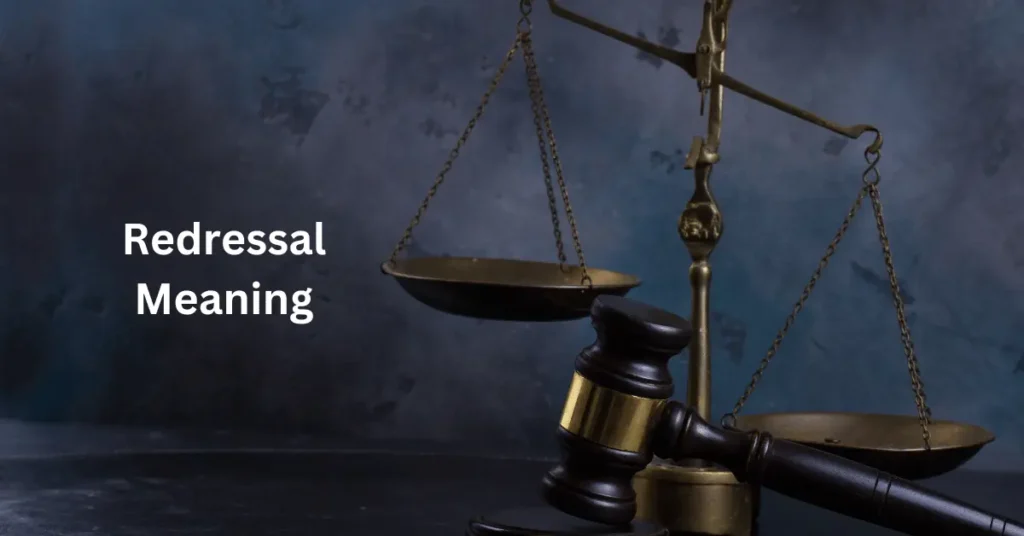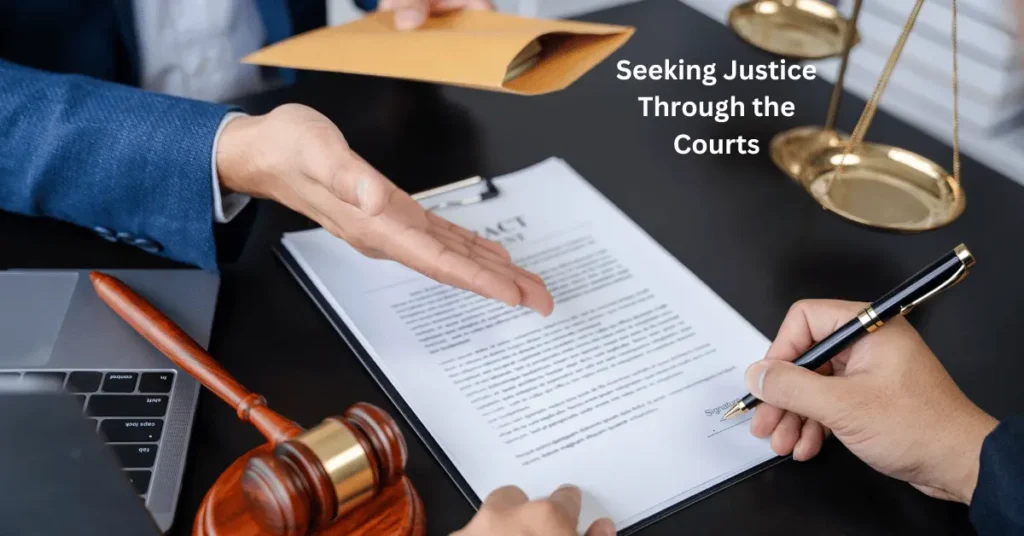Redressal Meaning

Learn about Redressal Meaning with us. Have you ever faced a situation where something wrong was done to you, and you wanted to make it right?
That’s where the concept of “redressal” comes in.
Simply put, redressal meaning is all about correcting a mistake or providing compensation for harm or unfair treatment.
Whether it’s in legal matters, customer service, or any other area, redressal ensures that wrongs are addressed, and the affected party is compensated or treated fairly.
In this blog post, we’ll dive deeper into the true meaning of redressal, its history, and how it works in different contexts.
So, let’s explore this important concept together!
What Does It Mean?
The term redressal refers to the act of correcting or compensating for a wrong or an injustice. It involves taking steps to make things right after something unfair or harmful has occurred.
In simple terms, it’s the process of fixing a mistake or offering restitution for harm done.
This could involve actions like issuing a refund, providing compensation, or simply acknowledging and addressing a grievance to ensure fairness and justice.
When someone experiences an injustice, whether it’s a consumer, employee, or even a community member, redressal serves as the solution to restore balance.
It ensures that the affected party is given what they rightfully deserve, whether it’s in the form of a remedy, compensation, or an apology.
In various contexts, redressal might take different forms. For instance:
- In legal terms, redressal could mean seeking justice through courts, where an individual asks for compensation or the correction of a wrongful action.
- In customer service, it might involve resolving complaints, offering replacements, refunds, or solutions to make up for a poor experience.
- In human rights or social justice, redressal might involve correcting societal wrongs and ensuring those who were harmed are compensated or have their voices heard.
Ultimately, the essence of redressal is about fixing wrongs, addressing grievances, and ensuring that justice is served in whatever form is appropriate for the situation.
Redressal Meaning: Definition and Examples
Redressal can be understood as the act of correcting a wrong or injustice that has been done to an individual or a group.
The main goal of redressal is to ensure fairness by making amends for any harm, damage, or wrongdoings.
It involves actions taken to address a grievance or provide compensation to those who have been harmed or wronged in some way.
Definition
Redressal refers to the act of setting right an unfair or unjust situation, whether by fixing the wrong, offering a remedy, or compensating for the damage caused.
It can be seen as a corrective action taken to restore balance and ensure that the person or entity responsible for the wrong is held accountable.
The process of redressal varies depending on the nature of the wrong, the severity of the situation, and the context in which it occurs.
It can occur in legal settings, business transactions, customer service, and even in the context of social or human rights issues.
Examples of Redressal Meaning
Consumer Complaints (Business and Customer Service)
Example: If a customer buys a product online and it arrives damaged, the company may offer redressal by sending a replacement product or issuing a refund. The company is addressing the grievance and ensuring the customer is satisfied with the resolution.
Context: In consumer protection, businesses are required to provide redressal mechanisms for complaints, whether through exchanges, refunds, or compensation.
Legal Redressal (Justice and Compensation)
Example: In a court case, if a person is harmed due to someone else’s negligence (for example, a car accident), the injured party may seek redressal through the legal system by filing a lawsuit and requesting compensation for medical bills, damages, or lost wages.
Context: Legal redressal is often associated with the judicial process, where courts determine whether a wrong has been committed and what the appropriate remedy or compensation should be.
Employee Rights (Workplace Issues)
Example: If an employee feels they have been unfairly treated, such as being denied a promotion or being discriminated against, they may seek redressal through the company’s grievance redressal mechanism or file a complaint with a labor board or a human resources department.
Context: In workplaces, redressal systems are in place to ensure that employees’ grievances, whether related to unfair treatment, wages, or working conditions, are addressed.
Social Justice (Human Rights)
Example: In the case of a community affected by land grabbing or unjust eviction, they may demand redressal from the government or relevant authorities in the form of land compensation, relocation assistance, or legal action.
Context: Redressal in the realm of human rights may involve addressing historical wrongs, such as reparations for marginalized groups or communities that have faced systemic injustice.
Key Takeaway
In essence, redressal meaning revolves around righting a wrong, whether through compensation, correction of the action, or other forms of justice.
It ensures that individuals or groups who have faced harm or unfairness are treated fairly and receive appropriate restitution.
Word Origin of Redressal
The term “redressal” has its roots in the English language, drawing from older Latin and French influences. To fully understand the origins of this word, let’s break it down:
Etymology of “Redress”

The word “redress” is the foundation of “redressal” and can be traced back to Middle English and Old French.
- Middle English: The word “redresse” was used in the 14th century, which meant “to straighten” or “to correct.” It referred to the act of correcting something that was wrong or unjust.
- Old French: The term “redresser” in Old French, from which “redresse” was derived, meant “to set right,” “to correct,” or “to straighten out.” The verb “redresser” was a combination of “re-” (meaning “again”) and “dresser” (meaning “to set” or “to arrange”), indicating the act of setting something back to its proper or correct position.
- Latin Influence: The Latin root of “redresser” comes from “re-” meaning “again” and “directus,” meaning “straight” or “direct.” This Latin combination suggests the idea of making something straight again after it has been out of order or unjust.
The term “redress” in English originally referred to correcting or remedying a wrong, restoring justice or fairness, and providing compensation for harm.
Over time, the suffix “-al” was added to form “redressal,” which specifically refers to the process or action of providing redress.
Meaning Evolution
From these origins, the meaning of redress evolved over time. Initially, it referred broadly to any kind of correction, especially in the sense of making something right or fixing a mistake.
As it became more widely used, it developed a more specific connotation related to providing compensation, making amends, or correcting injustices in various settings (such as legal systems, customer service, or social justice).
Thus, redressal retains the same essence of making amends and ensuring fairness, but it has come to be recognized as the process or system in place to achieve that fairness.
FAQs
What is the meaning of redressal?
Redressal means correcting a wrong or providing compensation for harm or unfair treatment. It involves taking action to make something right, whether through addressing grievances, offering restitution, or ensuring justice in various situations like legal, business, or social matters.
How is redressal different from a refund?
While both redressal and a refund involve fixing a wrong, redressal is a broader concept. It refers to any action taken to right a wrong, which could include refunds, but also includes other forms of compensation, such as apologies, replacements, or corrective actions. A refund is a specific type of redressal in business or consumer service situations.
In what situations can I seek redressal?
You can seek redressal in various situations, including:
If you experience unfair treatment in the workplace or due to discrimination.
If a product or service you purchased is defective or unsatisfactory.
If you are a victim of a legal injustice, such as negligence or wrongful action.
If there are social or community grievances that need addressing.
Redressal ensures that wrongs are corrected and individuals or groups receive what they are entitled to.
Is redressal always legal action?
No, redressal is not always legal action. While legal redressal involves seeking justice through courts or other legal systems, redressal can also be informal. For example, customer service redressal might involve offering a replacement or a refund without the need for legal proceedings. It can simply be the act of addressing a grievance or complaint in a fair and just manner.
How do businesses handle redressal of customer complaints?
Businesses typically have a redressal mechanism or customer service process in place to handle complaints. This may include:
A customer support team to listen to grievances.
Offering solutions like refunds, replacements, or repairs.
Providing an apology or explanation for any inconvenience caused.
Ensuring that future issues do not arise by improving products or services.
Conclusion
In conclusion, redressal is all about making things right when something wrong has occurred.
Whether it’s correcting an injustice, offering compensation, or fixing a problem, redressal ensures fairness and justice in many areas of life—be it in legal matters, customer service, or social issues.
By understanding what redressal means and how it works, we can better navigate situations where our rights or interests need to be addressed.
Ultimately, redressal is a key part of creating a fairer and more balanced society, ensuring that everyone receives the justice they deserve.
Extra Points on Redressal
- Redressal Promotes Fairness: At its core, redressal is about ensuring fairness. When wrongs are corrected or compensated, it helps create a more just and balanced environment for everyone involved, whether it’s in business, law, or society.
- Redressal Can Be Formal or Informal: Redressal doesn’t always require a legal process. It can happen informally, like when a company resolves a customer complaint by offering a quick solution such as a refund or replacement. However, in more serious cases, it may require formal legal action.
- It Builds Trust: When organizations or individuals take steps to correct wrongs, it helps build trust. People feel more confident knowing that their grievances will be heard and addressed fairly, whether they are consumers, employees, or citizens.
- Redressal Systems are Important: Having a proper redressal system in place—whether it’s for customer complaints, workplace issues, or social injustices—ensures that people know where and how to seek help. A clear process makes it easier for people to seek resolutions when problems arise.
- Redressal Promotes Accountability: By providing a means to address complaints or grievances, redressal encourages accountability. It holds parties responsible for their actions, ensuring that mistakes or injustices do not go unaddressed.
- Redressal is a Right: In many cases, seeking redressal is a legal right. Individuals have the right to ask for justice when they have been wronged, whether it’s in a consumer dispute, workplace issue, or legal matter.